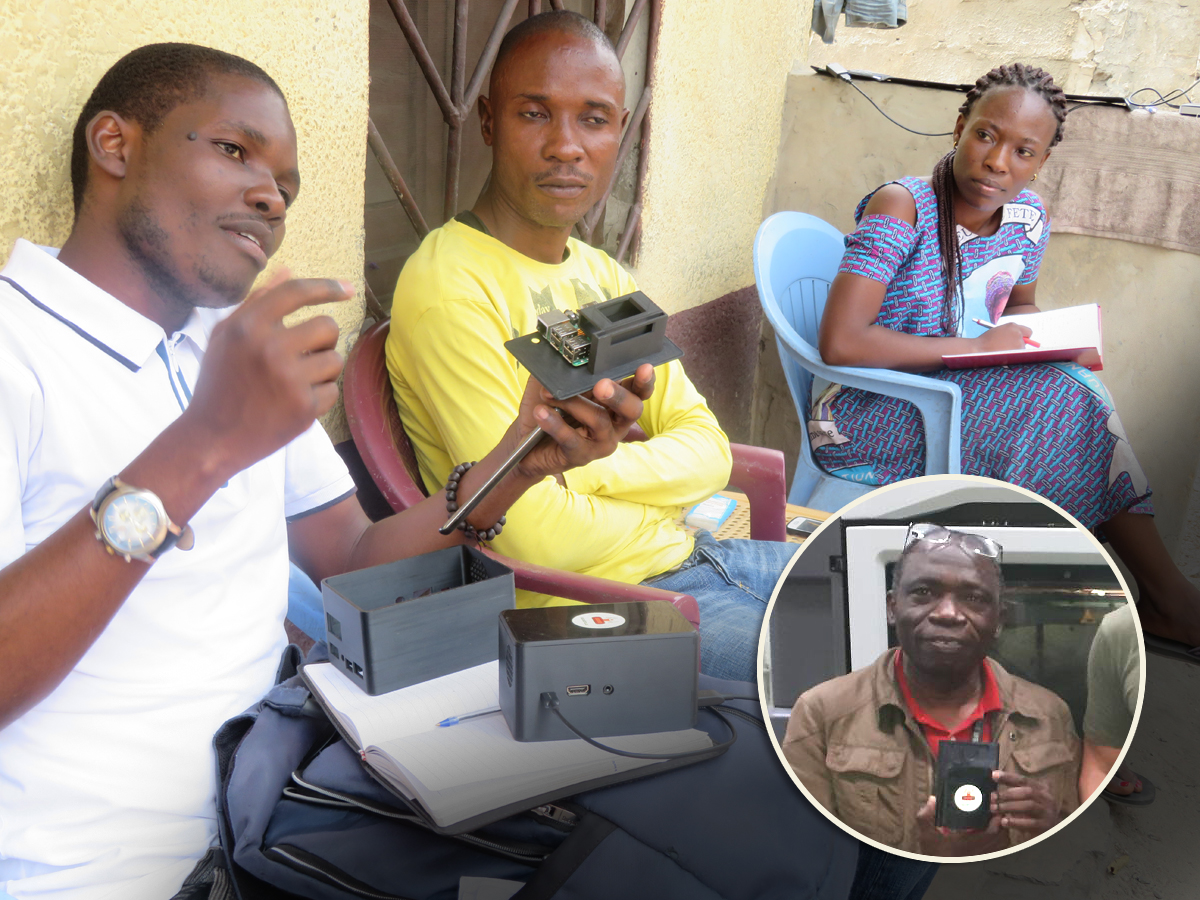Global Village – FMF inventor solving Africa’s WiFi woes
By Lookout on Sep 18, 2019 with Comments 0

Future Lokole users have a look at the inner working of Nzola Swasisa’s invention, Lokole. Lokole operates similar to a portable router and is helping spread access to the internet to underserviced and remote regions of his former country. Inset: Founder and Lokole team lead Nzola Swasisa.
Peter Mallett, Staff Writer ~
An electronics apprentice, and inventor, from Fleet Maintenance Facility Cape Breton (FMF CB) is on a quest to help spread vital internet communications to underserviced and remote regions in Africa.
Nzolantima Swasisa travelled to his former hometown of Kinshasa, the capital city of Democratic Republic of Congo, for three weeks in August to distribute 10 of his offline portable web and email network devices to local community representatives.
His latest invention is a tiny black box called a Lokole and can provide web and email access in a 25-metre radius for up to 100 users.
Lokole derives its name from an ancient Congolese drum used in pre-colonial times as a means of imparting vital communications between villages. Swasisa says having access to reliable communications is a game-changer in the Democratic Republic of Congo. Most people have no internet service; the more fortunate ones rely on wireless phone service to access the internet. “More than 60 per cent of the African population doesn’t have access to efficient internet communications and the problem is much worse in the Democratic Republic of Congo,” says Swasisa. “Lokole addresses this problem by creating a sharable local area network, allowing individuals in remote locations to sustain vital communication links.”
With skyrocketing and unaffordable wireless fees, Swasisa says Lokole makes access to the internet 100 times cheaper for the average person. His device allows community leaders to receive emergency government communications and alerts, educational documents for schools, health advice from medical professionals, the ability to purchase goods and supplies, and send business documents. The device can also be charged by a miniature solar panel.
Most business communication by municipal officials and community leaders is still printed on paper and hand delivered. They were surprised when Swasisa approached them and told them about his solution.
“When I tell them I have this device in my backpack that will allow them to use their cell phones and communicate without paying wireless fees they said: ‘Oh my goodness’,” said Swasisa. “I then tell them to take out their cell phone and use it to send emails through the internet and they are astonished.”
Lokole Takes Flight
Swasisa’s invention is nearly 30 years in the making.
The 60-year-old has been fascinated with electronics since the days when he travelled to his father’s place of work, the international airport in Kinshasa. His father was a firefighter at the airport and Swasisa listened intently when he explained the workings of beacons and signal lights on airport runways.
“When I was a teenager I took a trade as an electrician, landed a job at the airport and started working on those same beacons that I had been fascinated by,” said Swasisa.
Later in life, he began 20 years of employment with the Christian Mission Aviation Fellowship
(MAF), helping the NGO establish new radio communications systems in Congo, Angola, Namibia, South Africa, Zambia and Mozambique.
Through MAF he learned how to rebuild radios, and build radio transmitters and receivers capable of sending and receiving emails via radio waves. But Swasisa was forced to flee Congo to Angola in 1990, following widespread civil unrest in Kinsahsha that erupted under the leadership of former dictator Mobutu Sese Seko.
He eventually moved to Canada in 1998 when the Second Congo War broke out.
His experimentation and tinkering with radios, transmitters and electronics didn’t end there. After studying electronics at Camosun College, he landed a job as an electronics technician in Victoria with Schneider Electric where he worked for 14 years, and with Rimex/Tyresense Ltd before moving on to FMF CB in 2017.
Swasisa knew his communications work in Africa was far from over and continued to work on a newer high-tech solution to provide offline portable web and email network server. He stayed in touch with former Camosun staff and co-workers at Schneider, gaining insight into how to use Raspberry Pi single board computer components for communications purposes.
Returning to Africa
In 2010, he started his own non-profit Action Swasisa pour la Connexion et le Development Rural. That same year he returned to Kinshasa for the first time since the political unrest of the 1990s. He and his team built the first prototype of an offline mobile server called REC (Remote Email Centre) but the device was susceptible to breakdowns.
Despite the technical hiccups, he was recognized for his invention when Forbes magazine named him a finalist for the 2017 Innovation For Africa awards.
In 2016, he received software development and design help from Microsoft software engineer Clemens Wolf, a former Amazon engineer, which led to his second-generation invention called Lokole. Through his connections at Microsoft, Wolf got the attention of company executives who provided access to a professional, high-volume Azure cloud server for Lokole.
The finale piece for the invention came from his co-workers in the shipyard; Shawn Bathgate and Gerald Risma, who helped him customize a Lokole case, and Joel Pineau who printed out their case on a three-dimensional printer.
A way forward
The next step is to get Lokole to more remote, locations all over the Democratic Republic of Congo. Swasisa is confident he and his team can build a new prototype that will help Lokole work in locations outside the reach of cellphone towers.
He is currently in discussions with federal government officials in Democratic Republic of Congo to establish a centrally-located training centre, where electronics and software students can learn to build and then distribute Lokole themselves.
The devices aren’t cheap to manufacture or distribute, so Swasisa is looking for financial support and IT materials. He is also looking for technical expertise from software developers and computer engineers to help further his mission and improve Lokole.
For more information and how to support Lokole visit the website www.ascoderu.ca or contact Nzola Swasisa at nzola8@gmail.com
Filed Under: Top Stories
About the Author:





